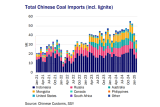
It has been busy recently in the palm oil sector. A spate of policies and measures are being announced or considered that may significantly impact the tanker market in the medium- and long-term.
To begin with, the EU’s policy to reduce its palm oil imports is getting another boost in December this year when the EU Deforestation Regulation becomes mandatory and only producers with the necessary certification will be allowed to sell their product in the EU. As of now, less than 40% of Indonesian palm producers have such certification.
Earlier this week, the Indian Agriculture Ministry, concerned about the livelihoods of millions of farmers, announced that it is considering increasing the import duties on edible oils (those were reduced in 2022 to help with the increased costs of living). Currently the import duty (including cess) on crude edible oil is 5.5% and on refined edible oils, 13.75%. While there is no indication on how much the increase would be, this is part of wider government strategy to reduce the country’s dependence on imported edible oils. In recent years, India has been covering about 55% of its edible oil needs by imports.
The demand for edible oils is considered to be inelastic and in the range of -0.1 to -0.3, meaning that a 1% increase in price would lead to 0.1%-0.3% decrease in demand. As India imports large quantities of edible oils, even small percentage drops in demand mean large declines in absolute numbers. For reference, during the marketing year 2022-23, the country imported about 16.5 million mt of edible oils, so taking an average of 0.2% drop in demand for each 1% rise in price would mean 33,000 mt less imported. But the price would rise by a few percentage points, so assuming 5% increase would see about 150,000 mt less imported quantity. If the country does indeed succeed in producing more edible oil domestically going forward – which is far from certain – it would mean even sharper reduction in imports.
The other – far more significant development – has been the announcement by Indonesia’s government that the country will proceed from the current B35 to B50 biodiesel mandate next year, which will mean an increase in the domestic demand for palm oil by about 40%. With such a hike in domestic consumption, there would naturally be less for export – a lot less and to the tune of 3 to 4 million mt/year, even if we factor in growth in production.
Depending on pricing, between 30 to 50% of all Indonesian palm oil exports go to India, Pakistan, Bangladesh and China. With such a bid expected drop in palm oil exports from Indonesia and the potentially lower imports from India this will certainly have repercussions for the Asian tanker market. An already suffering Southeast Asian market, due to weak Chinese chemical demand and overcapacity, may become an even more dreadful place for owners to send their ships.
And if we add all the chemical projects that will come online in India in the next year or two, or the decreasing Chinese CPP demand due to more renewables, the picture gets even gloomier. But that is a story for another time!
By Plamen Aleksandrov, Head of Research – Chemicals, SSY.
Articles
You may also be
interested in
View allGet in touch
Contact us today to find out how our expert team can support your business













